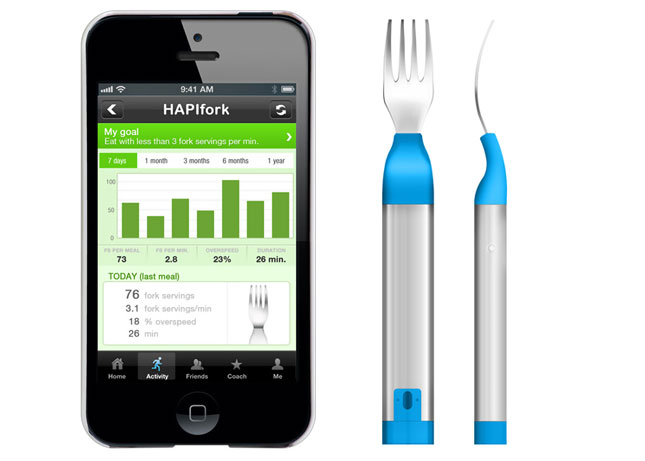
Image supplied by HapiFork
‘The Quantified Self’ or ‘The Connected Self’ are terms heard floating around the digital health circles. From upgraded sleep and stress trackers to creative devices like the HAPIFork that lets you know when you’re eating too fast – technology is empowering consumers to self monitor their well-being rather than relying on a trip to the doctor.
In the US where it is estimated over 25 million Americans suffer from diabetes or the UK where obesity rates have nearly quadrupled in the last 25 years, health costs are skyrocketing without the funds to support it. While most health care is spent on treating long-term illness, why not put time and money into preventative care?
Walter De Brouwer, CEO of Scanadu, said at this year’s Consumer and Electronics Show (CES), “People want to be empowered. They don’t want to be treated like children by the government or institutions.” Hence, the evolution of the term ‘the Quantified Self’ quoted by TechCrunch reporter Matt Burns. In his pre-show write-up, he noted this year’s CES was the first year major companies like Microsoft would not be present nor leading the way in innovation. Instead, smaller start-ups would be showing off more affordable, game-changing gadgets soon to change the way we think of health as we know it today.
In reading over many of the gadget reviews from CES, I found five that exemplified the vanguard Burns was referring to.
1. HAPIfork
An electronic fork that monitors and tracks your eating habits. A USB connector syncs the data with an online tool that helps you track not only what you’re eating, but what you shouldn’t.
A small chip-like device inserts into your smart phone and is able to measure stress by recording heart rate, blood oxygen levels, respiratory rate and heart rate variability. Zensorium calls it “the quick, revolutionary way to check your fitness and wellness… at your fingertip.”
3. HealthSpot
‘Hospital in a Box’ – this portable Health Kiosk can be stationed at drugstores and local businesses. The patient can access his or her doctors by a video monitor inside the box. Medical tools such as heart rate monitors can be used with instruction from the live health professional. Health records and prescriptions can also be accessed here.
4 . iRiver ON
Earbuds that stream music in addition to recording your biometrics while you exercise. The blue-tooth supported device measures calories, metabolic rate and energy usage.
This smart device is a strap worn around your lower back, and gives you a gentle vibration when you start to slouch. The blue-tooth enabled strap connects to mobile devices and allows you to track your posture progress in relation to your daily activity – whether sitting or walking.
Either way you look at – there is an opportunity for all of us to get moving and get monitoring. Don’t wait for the doctor to tell you what you need to – as Jason Jacobs, CEO of Runkeeper says, ‘You made it to the starting line. Now it’s time to get moving!’
